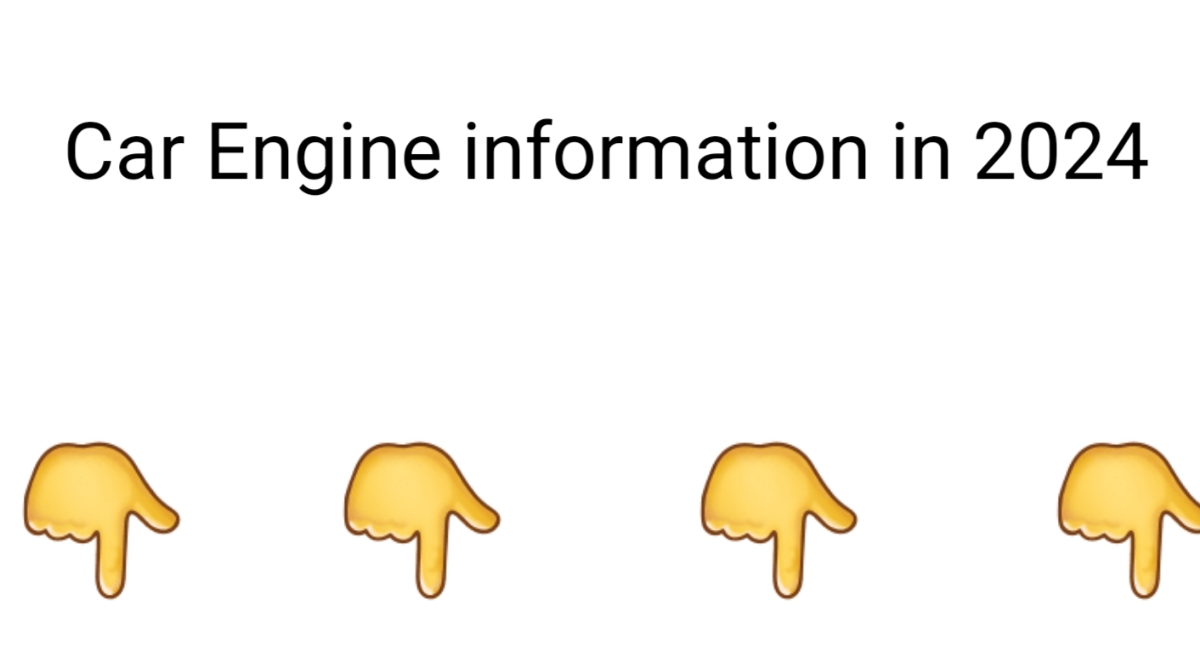Car Engine information in 2024
Introduction to Car Engines
Welcome to the exciting world of car engines! These powerful machines are the beating hearts of our beloved automobiles, propelling us down highways and byways with speed and precision. But have you ever wondered how these marvels of engineering have evolved over time? Or what lies ahead for car engines in the not-so-distant future of 2024?
In this blog post, we will delve into the fascinating journey of car engines from their humble beginnings to where they stand today. We’ll also explore some intriguing predictions for what’s to come, including electric and hybrid cars that promise a greener and more sustainable driving experience.
So buckle up and get ready to take a thrilling ride through time as we uncover the evolution, advancements, and maintenance tips for car engines in 2024. Let’s dive right in!
The Evolution of Car Engines from the Past to Present
The Evolution of Car Engines from the Past to Present
Car engines have come a long way since their inception, constantly evolving and improving with each passing year. From the early days of steam-powered vehicles to the introduction of internal combustion engines, the automotive industry has witnessed remarkable advancements in engine technology.
In the early 20th century, car manufacturers shifted their focus towards gasoline-powered engines. These engines were more efficient and offered greater power compared to their predecessors. Over time, improvements were made in fuel injection systems and ignition technology, leading to increased horsepower and smoother operation.
As we moved into the late 20th century, environmental concerns became more prominent. This led to a shift towards developing engines that produced fewer emissions without compromising performance. The introduction of catalytic converters helped reduce harmful exhaust gases, while innovations such as turbocharging improved fuel efficiency.
In recent years, hybrid cars have gained popularity for their ability to combine both electric motors and traditional combustion engines. These vehicles offer improved fuel economy by utilizing regenerative braking technology and automatically switching between power sources based on driving conditions.
Moreover, electric cars have emerged as a viable alternative to traditional internal combustion engine vehicles. With advancements in battery technology, electric vehicles can now travel longer distances on a single charge than ever before. Additionally, they produce zero tailpipe emissions which greatly contributes to reducing air pollution.
Looking ahead to 2024 and beyond, it is predicted that car engines will continue down the path of electrification. As governments around the world implement stricter emission regulations aimed at combating climate change, automakers are investing heavily in electric vehicle development.
Furthermore, advancements in artificial intelligence (AI) will play a significant role in optimizing engine performance by analyzing real-time data and making intelligent adjustments for maximum efficiency.
With all these exciting developments on the horizon for car engines in 2024 it’s clear that we are moving towards an era where sustainability meets performance – where powerful yet eco-friendly vehicles become commonplace on our roads. The future of car engines is undoubtedly electric, and we can
Future Predictions for Car Engines in 2024
As we look ahead to the future of car engines, it’s clear that exciting advancements are on the horizon. In 2024, we can expect to see a major shift towards electric and hybrid vehicles. These eco-friendly options will become increasingly popular as consumers prioritize sustainability and reducing their carbon footprint.
In addition to electric and hybrid cars, there will be continued improvements in fuel efficiency and performance for traditional combustion engines. Manufacturers are investing heavily in research and development to create more powerful yet environmentally friendly engines. We can anticipate higher horsepower outputs while minimizing emissions.
Another area of focus in 2024 will be advancements in engine technology that enhance connectivity and automation features within vehicles. Car engines will become smarter, allowing for seamless integration with other devices such as smartphones or smart home systems.
Maintenance and upkeep of car engines will also evolve in the coming years. With increased connectivity, vehicles will be able to monitor their own performance and diagnose issues before they become major problems. This proactive approach to maintenance will not only save drivers time but also prevent costly repairs down the road.
The future of car engines in 2024 is bright with innovations aimed at improving sustainability, performance, and convenience for drivers worldwide. As technology continues to advance rapidly, we can only imagine what incredible developments await us beyond 2024!
Electric and Hybrid Cars: The Future of Car Engines
Electric and hybrid cars have been gaining popularity in recent years, and it’s clear that they represent the future of car engines. With concerns over climate change and the need to reduce emissions, these alternative fuel vehicles offer a promising solution.
One of the main advantages of electric and hybrid cars is their environmental impact. They produce zero or significantly lower emissions compared to traditional gasoline-powered engines. This means cleaner air for everyone, reducing pollution levels in our cities and improving overall air quality.
In addition to being environmentally friendly, electric and hybrid cars also offer cost savings for drivers. While initial purchase prices may be higher than conventional vehicles, owners can save money in the long run through reduced fuel costs and maintenance expenses.
Furthermore, advancements in battery technology have led to significant improvements in range and charging times for electric vehicles. As more charging infrastructure is developed globally, range anxiety will become less of an issue, making these cars even more practical for everyday use.
Hybrid cars provide a bridge between traditional combustion engines and fully electric vehicles by combining an internal combustion engine with an electric motor. This allows them to operate on both gasoline or electricity depending on driving conditions. Hybrid technology not only reduces fuel consumption but also provides better performance with instant torque from the electric motor.
As automobile manufacturers continue to invest heavily in research and development for electric vehicle technology, we can expect even more breakthroughs in efficiency and performance within the next few years. Battery ranges will increase while charging times decrease further as new technologies emerge.
The future looks bright for car engines as we move towards a greener transportation system powered by electricity rather than fossil fuels. Electric and hybrid cars are paving the way towards sustainability without compromising on power or style.
Advancements in Fuel Efficiency and Performance
Advancements in Fuel Efficiency and Performance
When it comes to car engines, one key area of focus for manufacturers is improving fuel efficiency and performance. With increasing concerns about environmental sustainability and the rising cost of gasoline, drivers are looking for vehicles that can go farther on less fuel.
In recent years, there have been significant advancements in engine technology that have led to improved fuel efficiency. For example, direct injection systems have become more common in modern engines. This technology allows for a more precise delivery of fuel into the combustion chamber, resulting in better combustion and increased power output.
Another innovation is the development of turbocharged engines. These engines use a turbine-driven forced induction system to increase air flow into the engine, which then leads to greater power output without sacrificing fuel efficiency.
Additionally, hybrid technologies have gained popularity as they offer both improved fuel economy and reduced emissions. Hybrid cars combine an internal combustion engine with an electric motor and battery pack to optimize overall performance while minimizing reliance on fossil fuels.
Furthermore, advancements in lightweight materials such as aluminum alloys ensure weight reduction without compromising strength or safety features. Lighter vehicles require less energy to move them forward, thus conserving fuel consumption.
Manufacturers are also investing heavily in research and development of alternative fuels like hydrogen cells which promise zero-emission propulsion systems.
As we look towards 2024 and beyond, these advancements will continue pushing the boundaries of what’s possible with car engines. The future holds exciting prospects for even greater improvements in both fuel efficiency and performance. Drivers can expect cars that not only save money at the pump but also deliver exhilarating driving experiences!
Maintenance and Upkeep of Car Engines in 2024
Maintenance and Upkeep of Car Engines in 2024
As we look ahead to the future of car engines in 2024, it’s clear that the landscape is evolving at a rapid pace. With advancements in technology and a growing focus on sustainability, maintaining and caring for our engines will be more important than ever.
In this new era of automotive innovation, regular maintenance will continue to play a crucial role in keeping car engines running smoothly. However, with the introduction of electric and hybrid vehicles becoming increasingly common, traditional engine maintenance may change significantly.
For electric cars, routine upkeep will involve monitoring battery health, ensuring efficient charging infrastructure is available when needed, and maintaining optimal performance through software updates. On the other hand, hybrid vehicles will require attention to both their internal combustion engines as well as their electrical components.
Additionally, fuel efficiency and performance enhancements mean that engine systems are likely to become more complex. It will be essential for owners to stay up-to-date with manufacturer recommendations for servicing intervals and follow them diligently.
Fortunately, with advances in diagnostic tools and technologies such as remote vehicle monitoring systems becoming commonplace by 2024; identifying potential issues before they become significant problems should be easier than ever. This proactive approach can help prevent costly repairs down the road while ensuring optimal engine performance.
Furthermore, as car manufacturers increasingly emphasize sustainable practices throughout their production processes; eco-friendly materials may also find their way into engine construction. These developments could result in longer-lasting components that require less frequent replacements or repairs.
In conclusion (without using those words), the future of car engines holds exciting possibilities. From electric innovations to enhanced fuel efficiency measures; there’s no doubt that automotive technology is set to revolutionize how we drive.
While it’s impossible to predict every detail about what lies ahead for car engines in 2024; one thing remains certain – staying informed about industry trends and embracing new technologies will undoubtedly pave the way towards a greener future on our roads. So, let’s buckle up and prepare for the exciting journey ahead!


